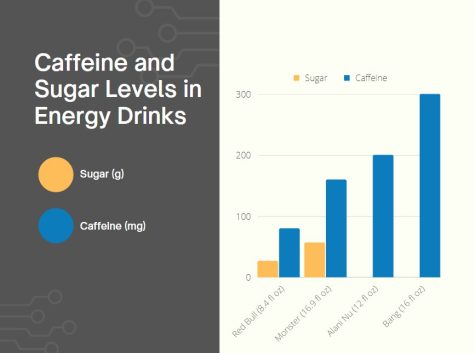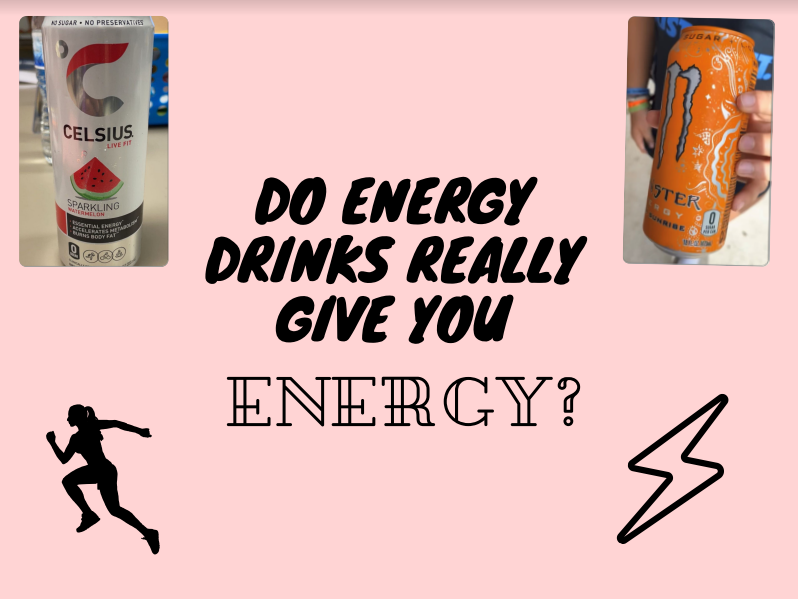Do energy drinks provide energy?
Teens across the globe consume high levels of caffeine daily. Around one third of teenagers from ages 12 to 17 drink energy drinks regularly. Teens commonly consume the drinks in the morning, prior or during school. Sold in vending machines across campus, energy drinks regularly attract students who receive minimal sleep. Research reveals the harm that drinks with high levels of caffeine can cause on a child, and provide healthier and safer options instead.
August 30, 2022
Known for their diverse flavors, energy drinks such as Monster and Redbull provide options ranging from original to Coconut Berry and Mango Loco. Companies create flavors to fit every pallet and preference. These beverages regularly contain high levels of sugar, however, brands like Bang, Celsius, Redbull, Monster and Alani Nu offer sugar-free options as well. The drinks seem appetizing, but ultimately stand unhealthy and dangerous when consumed on a regular basis.
Energy drinks primarily consist of caffeine, sugar and guarana. Caffeine can cause an increase in breathing, heart rate, mental alertness and physical energy. 200 mg of caffeine stands as the average amount of caffeine an energy drink contains. The sugars inside of energy drinks give drinkers an energized effect until the sugar and caffeine wear off and the body and mind begin to crash. Those who drink highly caffeinated drinks can experience withdrawal 12-24 hours after the last consumed drink, which can lead to irritability, anxiety, low energy and headaches. This leaves the consumer feeling fatigued and tired. The effects of the drink can last anywhere from 3-8 hours, but vary amongst people.
“Caffeine will dehydrate you. I understand it may increase your energy level but it’s a temporary, short-term kind of thing. I don’t think it’s good [students drinking energy drinks] because those things are usually high in caffeine. I actually drink one cup of coffee to start my day, but it’s just one cup. The thing that concerns me about energy drinks is how much caffeine, so if they [students] have something that doesn’t have a lot of caffeine like those drinks, it’s obviously better. That being said, you can get energy from other stuff as well,” Freshman football coach and AP World History teacher, Jeffery Bettis said.

Caffeine works differently for each body. In various cases, the drinks leave consumers feeling tired, rather than energized or awake. When consumed while dehydrated, caffeine can cause fatigue, dizziness, confusion, thirst and dry mouth and skin. The Food and Drug Administration (FDA) regulates 71 mg of caffeine per 12 oz of soda, however energy drinks hold around 120 mg of caffeine for 12 oz. With several energy drinks targeted at young consumers, The Center for Disease and Control (CDC) states children and adolescents should not consume energy drinks- or any highly caffeinated beverage. Excessive caffeine and sugar intake can lead to neurological disorders and long-term effects like insomnia, anxiety, headaches, irregular heartbeats and even death. In 2007, 1,145 teenagers ages 12 through 17 visited the emergency room due to an energy drink-related crisis according to the (CDC).
Although energy drinks promote brain stimulation and alertness giving drinkers the feeling of energy, the consequences of these drinks cause negative impacts on those consuming them. The effects of drinking energy drinks at a young age can cause long-term effects on teens.
“As someone who used to drink Celsius every day, especially when I have a game, I get really energized and pumped up when I first drink it but when it wears off my body gets really exhausted. My body relied on them and I became an addict. I chose to stop drinking them because on days that I wouldn’t, I would be more tired than usual and couldn’t function,” junior student-athlete Titomi Adeyinka said.







